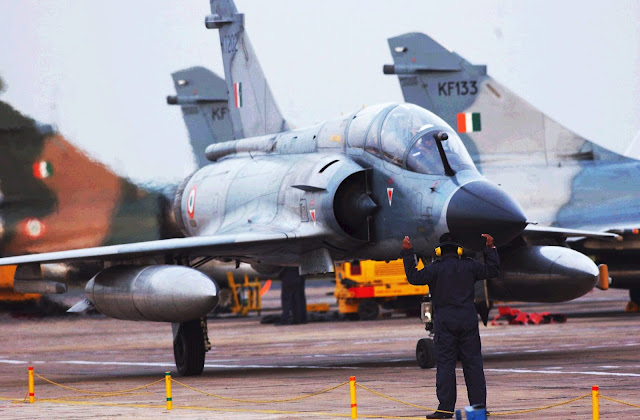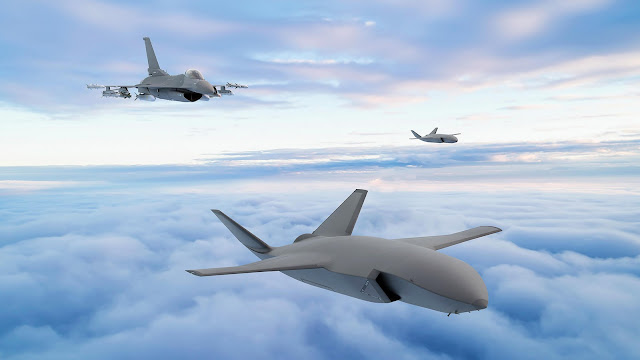
|
| In 2023, France will buy more Rafale jets. (Dassault Aviation) |
- According to the new budget proposal, France's defense budget in 2023 would be 439 billion euros, which is equivalent to $42.2 billion.
- In spite of the increase in spending, Wallace did not make a commitment to reverse a reduction of nearly 10,000 personnel in the British Army by the year 2025.
This week, both France and the United Kingdom announced significant increases to their respective national defense budgets. France, on the other hand, has provided specific details regarding how it intends to spend the additional euros, in contrast to the United Kingdom, which has chosen to remain evasive regarding how the additional money will be spent.
According to the new budget proposal, France's defense budget in 2023 would be 439 billion euros, which is equivalent to $42.2 billion. This represents an increase of 3 billion euros, or $2.89 billion, or 7.4 percent over the figure for 2022. This maintains the upward trend in defense spending that began in 2017, pushing the defense budget up by 36 percent from €32.3 billion ($31.1 billion) in 2017, and ensuring that it satisfies the NATO requirement that 2 percent of GDP be spent on defense.
The proposed budget, which was made public on September 27, requires the deliberation and approval of both the National Assembly and the Senate within a period of seventy days. However, given that it precisely follows the five-year trajectory that was established in the 2019-2025 military program law that was passed by the parliamentarians on July 13, 2018, it is highly unlikely that it will be rejected.
The majority of the budget, or €25.6 billion ($24.6 billion), is designated for the purchase of goods and services. The second largest area of spending is for salaries (12.4 billion dollars), with 29,700 new recruitments planned (of which 24,000 are military and the rest are civilian) and 1,500 new jobs created, particularly in the areas of cyber defense and intelligence.
At the beginning of this month, Minister of the Armed Forces Sébastien Lecornu brought up the issue of the need to increase ammunition stocks, which is a concern that has been raised by other European Defense Ministers in recent months. The spending plan allots a total of €2 billion ($1.93 billion) for munitions, and it states that the first test launch of the MICA air-to-air missile of the next generation will take place in 2023.
According to the proposed budget, the French Armed Forces will also receive key upgrades to a number of important pieces of equipment during the course of the following year. These include 13 Rafale fighters for the Air Force, 13 upgraded Mirage M2000 D jets, three Phénix MRTT multi-role tanker aircraft, two A400M Atlas transport aircraft, five NH90 helicopters, five Tiger helicopters, 18 refurbished Leclerc battle tanks, one supply vessel, one nuclear attack submarine, and one patrol vessel. Additionally, there is one supply vessel, one nuclear attack submarine, and one patrol vessel.
In addition, one billion euros ($962.7 million) out of the total budget of eight billion euros ($7.68 billion) is allotted for research and development (R&D).

|
| Defense Secretary of the United Kingdom, Ben Wallace |
In an interview that took place on September 26 with the Sunday Telegraph, the Defense Secretary of the United Kingdom, Ben Wallace, stated that the country's spending on defense would effectively double by the year 2029 and reach £100 billion ($107 billion), whereas it is only £48 billion ($51 billion) at the present time. And this is despite the plummeting value of the pound and the general economic upheaval that was caused by the mini-budget that was announced on September 23 by the new Chancellor of the Exchequer, Kwasi Kwarteng.
According to Wallace, Prime Minister Liz Truss has committed to raising the amount spent on defense as a proportion of GDP to "2.5 percent by 2026 and 3 percent by 2030." Nevertheless, Ben Zaranko, an economist with the Institute for Fiscal Studies, was cautioned by The Guardian that the £100 billion figure "somewhat overstates how big of an increase this would be." This warning was published in The Guardian. According to The Guardian, the additional £52 billion compared to the current figure includes an increase in real terms of approximately £23 billion. The remainder of the difference is accounted for by inflation (which is currently at nearly 10 percent) and the impact of future economic growth.
In spite of the increase in spending, Wallace did not make a commitment to reverse a reduction of nearly 10,000 personnel in the British Army by the year 2025. However, once the defense and foreign policy review that Truss commissioned to be written is finally made public toward the end of this year, this could be subject to change.
According to statements made by Wallace to the Sunday Telegraph, it is "highly likely" that we will expand the Army; however, this expansion might not take place in the areas that your "armchair generals" want you to, because what we truly require is, for example, an investment in our ISR capability. Always expect people to bring up the regiments, whether it be "Will you bring back the rifles?" or something else entirely. "It is more likely than not that we will be bringing about artillery batteries, additional signals intelligence, additional electric warfare, and most certainly capabilities to counter UAVs. "

|
| UAV loyal wingman |
The defense budget of the United Kingdom (UK) has been steadily increasing since 2016, when it hit £41.5 billion ($44.3 billion), the lowest figure since 2003. This trend mirrors that of France. The largest increase occurred between the years 2021 and 2022, when the budget went from £44.5 billion to £48.6 billion ($47.5 billion to $51.9 billion). However, this was only a marginal increase over what the budget had been in 2010/11, at the height of the conflict in Afghanistan, when it was £48.4 billion ($51.7 billion), when Britain's defense budget was at its highest point.

